First of all thank to the Scuola Normale Superiore di Pisa for the idea of this day dedicated to Franco Serantini: the conference today that honors the poor boy and the evening in which we listen to the music of Francesco Filidei comes from his opera "NN" inspired by the story of the young anarchist killed by the police on the Lungarno Gambacorti of this city in May 1972.
My book, “Il sovversivo” - "subversive," which recounts the life and death of Franco Serantini, was published by Giulio Einaudi in spring 1975. Coming here today I thought of two remarkable coincidences. To present "Il sovversivo” on 23 April that year, in the Aula Magna della Sapienza, before an overflowing audience - young people in the context of that time - were Nuto Revelli and Lelio Basso. The presence so many years later, of Marco Revelli, son of Nuto, the great writer's memory - war, peace, soldiers, peasants, women - makes me reflect on the continuity of generations in their best part, at least. A sign more than symbolic.
Another coincidence. Francesco Filidei, musician author of the NN, Pisan emigrated to Paris, was born in 1973, the year after the death of Serantini. As if to imply that the pieces of the time can be composed into one another in a natural continuity between past and present. For Filidei today, then, this day must be the dream and loving homecoming told by many writers in their pages.
It has been nearly forty years after Franco Serantini 's death and since then, in Italy and worldwide, have occurred countless facts which, in the seventies of the tragic twentieth century, will change the destiny of the community, the hopes turned on and immediately turned off by 'failure of the institutions and then by the terrorist violence that has canceled or did regress political gains is painful and hard. Hopes of new incinerated in the eighties, up to changing the world with the fall of the Berlin Wall. And then, in the nineties, roughly speaking, corruption first exploded and then denied, the victory of the policy is not benefiting those who do not know or ignore the rules of the rule of law, institutional decay until now, serious and dangerous, which It is not easy to remedy.
Public opinion is divided. On the one hand and uncritical cheering no matter what happens in political life also because of insufficient information. On the other often passive, secretly uneasy, with some signs of social protest and civil non-durable in the face of new laws so blatant that violate the Constitution: the fundamental principle of equality of citizens.
If democracy is, despite everything, the best system of government, one should meditate on that Norberto Bobbio, who wrote in an essay of 1984, "Government and the laws of men": "What is democracy if not a set of rules (called the rules of the game) to resolve the conflict? And what good governance is democratic if not, first of all, in strict compliance with these rules? Personally I have no doubt - writes Bobbio - the answer to these questions. And just because I have no doubt, I can safely conclude that democracy is the rule of law for excellence. "
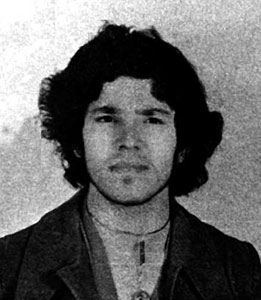 |
Serantini (Cagliari 1951 – Pisa 1972) |
 That name repeated
That name repeated
Compliance with the law is today and also applies to the case Serantini. The account of his terrible death goes far beyond the basic life of a Sardinian boy son of no one who has found himself in politics and the realization of his passions. That his name repeated so many times after the murder comes from the walls of Pisa, penetrates the buildings of the State Parliament, the Government, the Higher Judicial Council, involves the principle of separation of powers, the limits set by the codes of action and the Constitution, the rule of law, independence of the judiciary. The story also involves moral principles and civil society and the necessary guarantees to citizens the respect of those balances necessary in a state of law. After his death, Franco Serantini thus becomes the protagonist. From the minutes of the sergeants of police, from the reports of commissioners of public safety, the questioning of deputy public prosecutor, his name leaves deeper and deeper traces, especially in the hierarchy of justice: from the experts' judgments of medical-legal orders of the courts Instructors then, complaints and responses of the homeland of the right, in round circle, different from each other in the interpretation of the facts and law enforcement.
The story of the Sardinian boy arrived gradually at the top of the Florence Court of Appeal, the Attorney General Mario Calamari, not masked guardian in the executive office.
This opens up a conflict and sharp without saving shots from the Attorney General and the investigating judge of the Court of Pisa Paolo Funaioli, a magistrate cultured, intelligent, esteemed for his qualities as a jurist, for his scruples and the human waste any indulgence, as one would like, in the name of reason of state. Now he would certainly be accused of being "a red gown." Funaioli deeply believes in the independence of the judiciary. Even Calamari - defined in "subversive" character of medieval stained glass, with a vision of justice theocratic preached from a pulpit perpetually burning - said they liked "the intelligence and depth of doctrine" of a magistrate as Funaioli which is not short of its arrows and that it considers an enemy to defeat.
What is the story of a bitter budget not only as this court has not done justice and did not punish the Franco Serantini murderers in uniform? The accumulation of cases, conflicts between men of the institutions, the haunting call-back, only served to give credit to the dogma that the state can not be touched, unable to process itself as a clear and strong state should not be afraid to do.
Citizens, it is argued, are not equal before the law, as it is acquired in a democratic state. Article 3 of the Constitution of the Republic signed after the catastrophe of fascism and war, December 27, 1947, of great importance - the same social dignity of citizens before the law regardless of sex, race, language, religion, of political opinion, personal and social conditions - is unfortunately still a hope, a noble aspiration. Then and now..
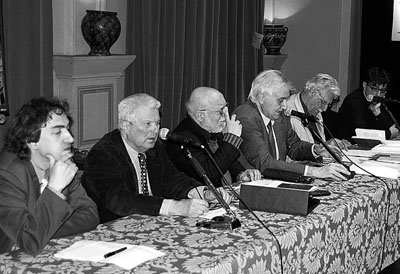 |
Pisa, 14 April 2011. The Teatro Verdi conference
presenting the work NN di F. Filidei,
from left to right: S. Busellato, C. Stajano,
C. De Incontrera, D. Menozzi, M. Revelli e F. Filidei. |
 It looks like a nineteenth-century history
It looks like a nineteenth-century history
Franco Serantini was born in Cagliari on 16 luglio1951. Abandoned at the orphanage, there remains two years. Is then given in custody to two spouses in Sicily. He is a public safety guard, the wife has some mound of earth in Campobello di Licata, Agrigento, in the hills in the south eastern end of Sicily, about twenty miles from the sea, a village burned, the wretched life . The couple lives happily in Cagliari for two years with the child, then his wife is seriously ill and all three leave for Sicily. The woman died in 1955. Franco is then given to the family of the wife of the guard, who became sergeant of PS. But the family falls apart - disease, migration, material needs - and demands that Franco is admitted to some institution for assistance in Sicily to be able to visit. But the provincial administration of Cagliari, responsible for the fate of the boy, in April 1960 ordered that Franco is instead given to the Institute of the Good Shepherd of Cagliari.
It looks like a nineteenth-century history, this of Franco Serantini, sectarian limits of the invention, without any light, only full of misery, violence, injustice. Since the birth Serantini knows one by one and without pity the misfortunes of the poor, through the chains of suffering and pain that always affect the excluded fate: death as a condemnation which destroys the precarious balance of subsistence, misfortune family, illness, unemployment, conflicts of interest all the more raw as the stuff in question is modest, with the poor such as food, like hope.
The Institute of the Good Shepherd is on the outskirts of Cagliari in a neighborhood called “Il Giorgino” A proletarian ghetto, then, with a desolate air of abandonment, in a landscape of North Africa where the seasons are marked, from summer to next spring, the arrival of flamingos, a long strip of white birds, pink and red take residence in the pond of Santa Gilla.
Franco was not yet ten years old, when he finished primary school. Then the sisters of the college enter him in this middle school, "Giuseppe Manno" of Cagliari. It 's a baby and then a boy closed, silent, unhappy. Character of tough, difficult, in need of affection and attention, mature thoughts in the solitude of his twisted and contorted. It is not a good student and even a good student. He has fifteen years, his relationships with the sisters are not good, the conflict did not break. At that age, in care institutions, there is almost always a break with the inmates because the provincial governments stop paying fees. In early 1968 the Sisters of the Good Shepherd seeks the court's juvenile court, expressing the impossibility of continuing to host Franco in the Institute, motivate the reasons of the conflict with the mood of the boy, bad temper, rudeness, aggression. The Court decides in this way, a masterpiece of humanity and rationality "Since the personality of the young is seriously disturbed by the absolute emotional lack and long institutionalization, the personality of the subject should be aided with a good understanding and affectionate treatment supporter."
The device of the ruling concludes that Serantini "to remedy the long-institutionalization" shall be confined in a reformatory. A fascist law allows it, a royal decree of 1939 then in force, I do not know if it is still true today: "The houses are intended for re-education for minors to minors to habits or contracted depending on the state of abandonment in which they give are manifest evidence of backsliding and appear in need of moral correction. "
Truly the most appropriate remedy to help a young without a criminal record who had a difficult life. The most appropriate to turn honest kids into criminals.
The Institute of observation for children of Florence sends France Serantini to the Institute of Rehabilitation male Thouar Peter of Pisa under the parole. The team consists of a psychiatrist, a psychologist, a social worker, after a long examination, considers the Sardinia boy intelligent. His IQ is 1.02, the average ratio is typically 0.70. The director and teachers are asked to do in order to satisfy, at the age of twenty-first birthday, the desire to enlist Franco in the Navy. The sea, freedom, and the mother.
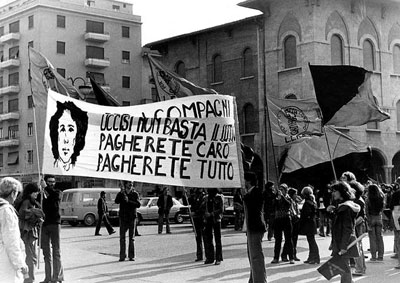
 With a deep sense of solidarity
With a deep sense of solidarity
Pisa, for Franco Serantini, is the discovery of life. The city fascinated him. What a contrast with that of green wheat field, the white of the Cathedral and the Baptistery, the Tower, monuments, narrow streets of old neighborhoods, the Arno, so far from the places where he lived, the Duchy of Campobello di Licata with the Iron Cross of the Passion in the square, and then the gray building at the Good Shepherd Giorgino of Cagliari where the only pastime was to watch the colorful strips of flamingos on the pond of Santa Gilla.
It is the different way of life that fascinates him. In Tuscany there is always a popular compassionate care for orphans. Amid the thousands of children in each region, streets and squares, Franco Serantini closed and introverted as it is, wounded by life, now feel like the others, no longer the mark of the son of nobody. Also be one of San Silvestro, Thouar institution that houses it, is not a burden, does not care much to say that is one of the reformatory. None or few tend. It 's relatively free, can leave in the evening, until 9:30.
Sure, it has not suddenly changed its character, is subject to mood swings, often restless, rebellious, out of love and lack of affection. But that quickly becomes another in '68, in the explosion of collective protest, demonstrations, marches, often incomprehensible words. He is proud, with a deep sense of solidarity, as seen in those who knew and were close. The passion for politics also takes him. He's only four years of life, Franco Serantini. He spends his last season well. His story, mentioned with many suffering decades later, is absolute, the symbol of an entire generation, perhaps inadequate, utopian, conceited, which has often betrayed after herself, unable to weigh the consistency of the balance of power which is the policy, but full of passion and desire to do.
Pisa is in those years, with Trento and Turin, the capital of the student protest. In 1967 the university are discussed "Theses of Knowledge", for the right to education, against the violence of the system, against the top of the union delegation. Few suspected that the spread of protest spreading then in the world, the French May, above all. With the student revolt were born extra-parliamentary groups. In Pisa is the most seasoned “Il Potere Operaio” with leaders in name. The political climate is on, demonstrations, strikes, charges of police, tear gas, the wounded, some dead are common as the conflict with the PCI, the great enemy.
Franco Serantini is right at home in this great commotion. It is like awakened. Happy to go to school, takes the middle school diploma, failure in Sardinia, he enrolled at the State for the professional market leading to the award of diplomas for accountants, company secretaries, officers tourist offices.
He pays attention to everything and everyone, as if to retrieve a lost time. Studying, reading what is a confused, bitter, with difficulty, it is void of any basis of knowledge. Did not forget the injustice and humiliation suffered as a child, is of course part of the social and civil progress. He attended the Communist Youth League, then the Socialist Youth Federation. It does not have general ideas, not even at the elementary level, tries to make up with the desire to understand. Often does not understand the languages that take into account the partisan tactics. It 's a smooth plate. Reject the prudence, the contradictions, the opportunists.
The massacre of Piazza Fontana, 12 December 1969, is an essential event to understand that time on fire. A caesura. Serantini a passion for what happened in Milan, always wants to talk about Valpreda, Pinelli, the massacre of the state. Begins to be seen at the site of Lotta Continua, personally, does not accept even the most ordinary rules of the group.
Is being done, the boy Sardinia. Blood donor, a waiter in the summer in Viareggio, seasonal worker in a factory of tiles. If you are not told in great detail the poor, but proud life of Serantini Franco, one can not fully understand the ferocity of his death.
The experience of red to the CEP market, the brainchild of Lotta Continua, involves him as everything is concerned. A group of boys buy fruit and vegetables in the orchards and sells it to the residents of that neighborhood at prices much lower than the shops. Primitive economy like Robinson Crusoe. Traders protest zone, the climate of tension in hot weather, the police intervened, beating the boys, makes the arrests. Franco barely gets along during a raid.
The Sardinian boy continues to read, wants to fill its gaps, is passionate about all the books in the hands. Buy, somehow, for some reason, "Magna and the populace in Florence from 1280 to 1295" by Gaetano Salvemini. His is the hard-won by that statement that he refused and that was also denied in the bitter years of adolescence. Culture as life, an essential tool for understanding the world. Built from scratch on virgin wax.
He has a more open character, less defended. made the acquaintance of three young couples in the educated middle classes. They invite him into their cozy homes. They are witty, loving, will try to give an order to his poor backgrounds. And happy, jealous of those friendships, happy people so far away of loving understanding of the worlds known until then.
Buy a book by its cover, black, writes above all that comes to mind, Valpreda, Pinelli, the facts of Bussola 68, Soriano Ceccanti injured, the disputes, the warm autumn. Stick in the notebook of newspaper articles, photographs, texts of songs of protest, but also pieces of essays on the existence of God and the immortality of the soul.
He attended a course in business accounting, he works in an office temporary punched cards contract by the IBM.
With his earnings puts aside some money and bought a used blue Ciao. Up and down the streets of the city, a party.
The life and death of Franco Serantini, a point in the history of the world, can make a mirror of what happens throughout the world.
The Sardinian boy leaves Lotta Continua, he hates small bosses overriding the will of hegemonic hierarchies, bureaucracies. At the end of 1971 approaches anarchists with natural way. He read in the meantime, with books on Fascism and the Resistance on the antifascism that fascinate him - the past is always contemporary - the classic texts of anarchism, Bakunin, Malatesta, Cafiero, Kropotkin. It is not an extremist violence, is exuberant, eager to act. Work like hell to write leaflets, pulling them to the mimeograph, and distribute them to go where and scream how it can.
The old anarchist who spend their days in dormitory buildings in Via San Martino near the Brotherhood of Mercy, are affected and sometimes disturbed by the activities of the Pinelli Group's young anarchist of which Serantini is the soul.
He has a few years of life, Franco Serantini. A short countdown to death, his. The 1972 comes quickly, the Sardinian boy has not yet turned 21.
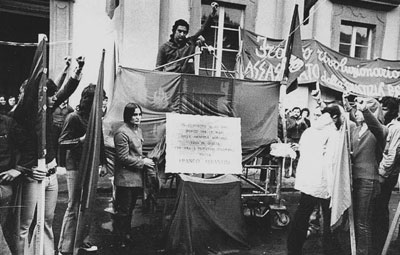
 His pride
His pride
The new Andreotti government loses a confidence vote in the Senate and resigned. president Leone dissolves Parliament and calls elections for May 7 and 8. In Pisa the bitter election campaign, the political climate is poisoned, they fear accidents the closing day of the election campaign, Friday, May 5. The city seemed under siege. From Rome came the swift clusters are also the police service paratroopers. They close in a pincer as the place of the meeting, the Largo Ciro Menotti, a small square in the center crossroads of small roads ideal for urban warfare. They are planning a fascist rally which opposes hard Lotta Continua and a meeting of the Left. The mayor, the administration is left, tries to object, unheard, the use of that dangerous place. The violent conflict explodes immediately. It seems that police officers have lost their light, and that command them. They shot hundreds of tear gas in any direction, you also hear gunshots. The youth of Lotta Continua, built barricades, throwing stones and Molotov cocktails. Three hours of bitter guerrilla warfare.
Franco Serantini is still, just - a sign of fate - at the corner of Via Mazzini and the Lungarno Gambacorti. He could easily escape, save himself. The jump on at least ten police officers, encrusted with the blows with rifle butts, batons, feet, fists, with violence, with cruelty. Show up for this poor defenseless boy all their anger, their fury, their frustration. His body was butchered, the head, chest, arms, shoulders. The necropsy is impressive sign of the terrible violence. The 55 "photographic surveys carried out on the body and on histological sections of fragments of organs taken during the autopsy" are the mirror to the heinous lynching. Not even a small area of the body of Franco remained untouched.
Two pages of “Sovversivo” reproduce verbatim the official results of the autopsy. Dario Fo, at the presentation of the book held in Milan, at the Liberty house, deep voice he read those two atrocious pages. Without a comment. In the silence of ice of a thousand people.
Even in death Franco Serantini suffers from the same misfortune that has befallen him in life. He was arrested shortly after 8 pm of that Friday, May 5. The PS commissioner noted in his report that is in dispute: "manifestation seditious, insulting the police." Did not lift a finger. Shouted insults, nothing more.
Is taken to a barracks. He can not remain standing, say the testimonial. At one night is locked up in jail Don Bosco. He is visibly ill, is white as a sheet, the body has broken. After noon on Saturday is questioned in prison by the deputy public prosecutor John Sellaroli: Do not you realize that Franco is dying.
"Asked the accused - says the report - why he had gone to the place of the city where the riots took place, he replied:" I went there because we believed. " There's all the character of Franco Serantini in this response, his pride.
"Asked what he believes in, he replied: 'I am an anarchist'." He went to the rally as a "maverick." Is sick, can not even hold up his head, answered questions from the judge with his head resting on the table. Is closed in an isolation cell. Must be regarded as a dangerous young man reduced to that state.
A doctor rushed him to visit the prison infirmary at 4:30 pm. Prescribes: "Sympatol Cortigen-bag of ice at all times."
Even a layman would understand that the boy's head is broken or something very serious, but that's not even been measured blood pressure, heart rate, temperature, pupil reactivity to light, evidence that would reveal immediately dramatic conditions of the prisoner. Inside the prison, Don Bosco, among other things, operates a fully equipped medical center, suitable for every kind of specialist intervention. The hospital is near.
Franco Serantini is not hospitalized, he is not done an X-ray, it is simply sent back to his cell from where he had come. But by evening will have an ice pack to put on Chief prescribed by his doctor.
He died at 9.45 am on 7 May 1972. The death certificate refers to a cerebral hemorrhage. That's it.
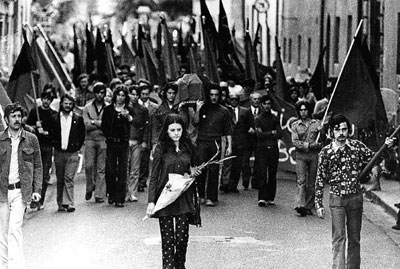
 A double death
A double death
The fate, so to speak, continues to rage on Franco Serantini. You try to bury him in haste, in secret. Lacks the clearance of the Prosecutor of the Republic, are not even past the 24 hours prescribed by regulation. The clerk of the status of the City should do what, refuses to sign the authorization and the attempt fails.
It's not over for Serantini. On 25 October of that year, when it filed the forensic examination, suffered another indignity. As if to say that if you wanted Franco's death, because he was not physically identical. It's in the written report, signed by prominent luminaries that Franco Serantini was "the bearer of a massive spleen, as a child, in fact, had malaria and the bones of his head - write the experts - they were thinner than normal: the diploe - the layer of tissue located between the bones of the skull - Franco Serantini was 0.30 cm thick instead of 0.40, 0.45, and therefore had less resistance to blows.
Laura Conti, doctor and writer, mockingly replies on the 'Unità "after the publication of" Sovversivo ", May 5, 1975:" You could call these medico-legal experts not to reread the most recent numbers of more sophisticated medical journals but a golden book Hippocratic 2500 years ago, 'The wounds of the head', which begins with these words: "The wounds of the men are not like each other", something which the doctor was asked to take into account also in the choice of the drill: Hippocrates, if the patient had normal blood thinner, advised against the hand drill to make every endeavor also specifying the precautions to which we had to do. "
Also a medical student - Laura Conti notes - would have realized that the sadistic fury of the police-criminal must have caused - the numbness, the inability to keep his head raised, other visible behaviors - an intracranial hematoma. Operable, salvageable.
The death of Franco Serantini causes motions of outrage, appeals, complaints and parliamentary questions, responses from all the newspapers of the Left, anarchists papers, the 'Unità', the 'Avanti! ", The" Manifesto. " Poems, pictures, songs, reminiscent of the Sardinian boy..
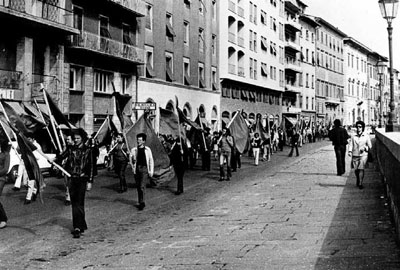
Umberto Terracini, who spent twenty years in Fascist jails and is a connoisseur of prison regulations, writes on "Rinascita", shortly after Franco's death, an article full of indignation. Will be charged with contempt of the judiciary and armed forces of the State:
"This time, let's face it, our mind and consciousness arises horrified clamored for stricter penalties not only ready in front of us because there is another dead man killed by police, which marks the bitter path of blood that beats the Italian people and argues for the defense of their freedom against the guilty indolence of rulers and the return of villainy fascist crime, but also how cruel of the killing and may it gave us the revelation of the extreme degree of degradation to which the regime led to complicit silence of dark intrigue, the power state of the Republic.
Why in Pisa, to make the horrible murder of Franco Serantini, student worker, and groped to send him to go unpunished, they are undoubtedly data voice and hand, not without some nod from Rome, all the components of its powerful repressive apparatus: the police, judiciary and prison. The police have in fact massacred blows the young unfortunate, the jailers, in complicity with the various prison officials, have left without treatment in its excruciating agony, and finally a judge has thought to throw on the drama of the frozen layer of bureaucratic ice verbalized his indifference, pretending not to notice that a dying man questioned the witness only as a memoriam (...)".
To Franco Serantini has touched a double death. The savage death at the hands of the police and the death decreed by the institutions that have not done justice, conflicts between courts, lawyers, judges attempted transfers, reservations, lies. As I mentioned earlier in my speech.
Not all men of the State, again, worked in the same disgraceful way. There is also another Italy. I would remind the magistrates Funaioli Paolo, who died a few years ago, and the then magistrate Salvatore Senese now president of the Chamber in the Supreme Court, who fought with courage, to be loyal servants of the state and the law which is the key. I would remind the then Commissioner of Public Safety Giuseppe Pironomonte, the officer who arrested Serantini removing him from the hands of agents of violence. Immediately after the death of the boy from Sardinia, had a crisis of conscience and resigned from the police. I managed to speak to him in Rome. He worked as a Group B clerk in a ministry. He told me that in the house he kept a photograph of Franco Serantini.
If at least the Sardinian boy's death served to avoid painful death came later, to prevent violations of the law and the Constitution of the Republic, the amount of paper that is made to delete all these years! It has not happened. Men of the State, whose task is to ensure the safety of citizens, were responsible for serious illegality. Most of the time did not pay any penalty when they have not benefited their careers.
Some cases of recent years. Do I have this data Luigi Manconi, President of "A buon diritto" that has collected ample documentation of lives broken. 1700 deaths in prisons in ten years, a third suicide.
Genoa, July 20, 2001. The death of Carlo Giuliani, 23, killed by a policeman during the G8 summit in Piazza Alimonda. And what happened in those days - indecent fascist regurgitation - on the school and the barracks of Bolzaneto.
Ferrara, 25 September 2005. Federico Aldrovandi, 18, killed in a city street by four police officers, "the victim of a violent physical confrontation" - say the documents - without a reason. 54 lesions on the body of the young. The policemen were convicted of culpable excess.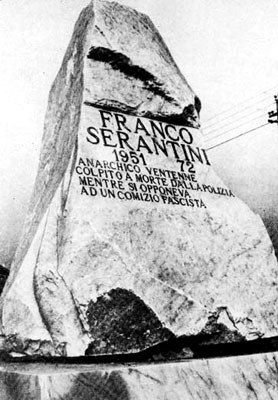
Castiglione delle Stiviere (Mantova). 16 novembre 2005. Katiuscia Favero, 32 anni, morta nell’ospedale psichiatrico giudiziario, il collo dentro un cappio ricavato da un lenzuolo bagnato legato a una grata malferma. Anche in questo caso ombre e omissioni.
Roma. Ospedale Sandro Pertini. 22 ottobre 2009. Stefano Cucchi, 31 anni, “trovato morto“ all’interno del reparto protetto dell’ospedale. La sua è una lunga odissea tra caserme, prigioni, ospedali, celle di sicurezza, ambulatori, infermerie, una cella del carcere di Regina Coeli, il pronto soccorso del Fatebenefratelli. Dodici stazioni di una Via Crucis. Il processo è in corso, per il coraggio della famiglia, la sorella, soprattutto. Come viene a sapere la madre di Cucchi della morte del figlio? “Signora, dobbiamo farle firmare dei documenti” le dicono i carabinieri sulla porta di casa. E lei:”Che cosa devo firmare?” “La notifica del decreto del pubblico ministero che autorizza la nomina di un consulente di parte per eseguire l’autopsia”.
 La città è partecipe dolente
La città è partecipe dolente
Castiglione delle Stiviere (Mantova). November 16, 2005. Katiuscia Favero, 32, died in a psychiatric hospital, the neck in a noose made from a wet sheet tied to an unstable grating. Again shadows and omissions.
Rome. Sandro Pertini Hospital. October 22, 2009. Stefano Cucchi, 31, "found dead" in the secure hospital ward. His is an odyssey of barracks, prisons, hospitals, security cells, clinics, dispensaries, a cell in the prison of Regina Coeli, the emergency room of Fatebenefratelli. Twelve stations of the Via Crucis. The process is ongoing, for the courage of the family, his sister, especially. How the mother learns of the death of her son Cucchi? "Madam, we have you sign the documents," they told the police on the doorstep. She said, 'What do I sign? "" The notification of the decree of the prosecutor authorizing the appointment of a consultant of the parties to perform the autopsy. "
The city is participating sore
From life, Franco Serantini had only a gift, the funeral. Allow me to close this thing of the Sardinian boy, to read the page on which on the "Sovversivo" I tell the story.
"The coffin is lying the flag of anarchism, red and black. The companions to carry on their shoulders, it looks like the caress her cheek. The procession of thousands of flags, red, red and black, black with the "A" red form as a giant rack of spears, the faces are threatening, the pain is mixed with anger.
The funeral of Franco Serantini, Tuesday, May 9, 1972: a mixture of decay and pride, and awareness of tension which once again is over, for one, perhaps for all. We are the boys of the demonstrations, marches, sit-ins, the protest, with jackets, sweaters, jeans, beards, hats in China, there are the anarchists of Tuscany, some older , cravat with blacks, there are the mayor, members of the left, trade unionists, communists, socialists, young Republicans.
A thoughtful girl, who walks in front of the coffin, holding with both hands a bouquet of red gladioli. The sanitation workers hold their crown, the crown another lead the boys in the reformatory. The crown of the City Council and call white, held aloft by local police. Prisoners of Don Bosco have left the daisies, the mass of heads sprout pillow of violets, roses, carnations .(...)
The funeral was moved from the morgue before the botanical garden in Via Roma. Serantini remained naked for several hours, his dress had been sequestred for his expertise and he did not have another. Then came a fellow with a jacket, a pair of pants and a red rose to put on his chest.
The city is involved, sorry, the people took flowers, women replace the unknown mother and cry no one's son. The parade, which took place in the Field of Miracles, is a grim fascination. The red and black flags and thousands of fists uplifted toward the afternoon sun makes it look even more white and motionless as marble of the Cathedral, the tower, the baptistery and softer green lawn. There is an atmosphere of solemn expectation, there is a great silence, broken by the roll of steps. "